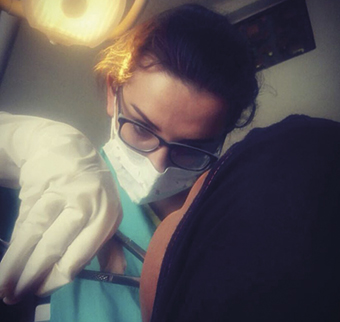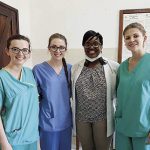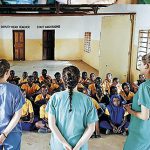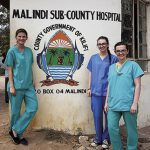Elective adventure in Africa
Three final-year dental students from Trinity College Dublin travelled to volunteer in a Kenyan hospital. Jill McTernan takes up the story
This summer I had the amazing opportunity to travel to Kenya for a month and volunteer as a dental student. After a lot of research, I came across an inspiring man – Hari Lal – writing in the Scottish Dental magazine (Ireland’s Dental’s sister magazine) about his fantastic adventure with Gracepatt Ecotours Kenya, who organise volunteer opportunities for dental and medical students. They offered to place myself and two classmates, Nicole Morgan and Sylwia Nowak, in a hospital in Malindi, a town on the eastern coast of Kenya. Malindi has a population of 200,000 with many people there suffering from extreme poverty.
In July, we packed our bags and flew to Nairobi, eagerly anticipating the month ahead. We were warmly welcomed by trip coordinator Patrick and, while in the city, we visited an elephant and giraffe centre. I couldn’t think of a better introduction to Africa than to get up close to these incredible animals.
The next day, we boarded a bus to Malindi, although we didn’t realise at the time that it would take us ı4 hot, long hours to reach our destination. The trip was made all the more interesting by the company we had, namely, a chicken who liked to cluck endlessly and roam the bus in search of food.
When we finally arrived we were picked up by our host mother and brought to her home which we would be sharing with her and her family for the length of our stay. The house was comfortable and modern and we were very grateful for a cold shower and cool bed that night. It was here that we were introduced to traditional Swahili dishes and culture and taught some basic Swahili to use in the hospital.
On Monday morning, we began our elective at the hospital. Here we met the dental team which included a dentist, two dental hygienists and a dental technician. The staff were friendly, hard-working and very efficient. We quickly got to work as there was a queue of patients waiting outside the door.
Examinations were carried out by the dentist and he took seconds to identify the source of the pain, usually by visual exam only. The hospital did not have the capacity to take periapical radiographs, so OPGs were the only radiographs available to us. Patients were treated in a conveyor belt-like manner with one patient in the dental chair, one being examined and one waiting for treatment, all in the same room.
Extractions were by far the most popular treatment option for any patient with dental pain. Root canals and restorations were too expensive for most patients and many locals believe only extraction will relive their pain, no matter how hard you try to convince them otherwise. We carried out many extractions ourselves and there was comfort in being able to call upon the dentist or the hygienists, who were very proficient with extractions, for help at any time.
There were many memorable moments from our time in the hospital, including treating prisoners with their heavily armed guard only metres away, or watching the hygienist carry out a difficult wisdom tooth extraction under local anaesthetic in minutes. We also saw a number of patients with very large tumours of the head and neck, as often these patients leave it very late to seek treatment. These were referred to Nairobi for treatment.
- (Left to right) Jill, Nicole, Dr Lucy Kaluvu and Sylwia
- The Trinity students giving an oral health presentation to local school children
- Sylwia, Nicola and Jill outside their Kenyan hospital base
Every afternoon we would visit a local primary school where we would give oral hygiene instruction to a group of 30-50 students ranging in ages from eight to ı6. The children loved to see us coming and would run to greet us at the gate. We used models, posters and some basic Swahili to cover topics such as diet, brushing technique, caries, fluoride and periodontal disease. At the end of each session we answered questions and distributed toothbrushes and tooth pastes to the children. It was really great to see everyone getting involved and to hear them say they were going to tell their entire family about what they had learned from us.
My time in Kenya was both eye-opening and heart-warming as I felt we had provided vital treatment to those in need and also educated the next generation in hopes they may suffer fewer dental problems in the future. I would recommend a dental elective to any student interested in helping others while also gaining an insight into an entirely different culture. I will definitely take this experience with me and I hope to continue volunteering after I graduate.
I would like to thank Gracepatt Ecotours for their support and services, Scottish Dental magazine for their published article and Hari Lal for sharing his experience.
Hari Lal, GDP from Glasgow, whose article in Scottish Dental magazine inspired Jill, Nicole and Sylwia to head to Africa, gives his thoughts on volunteering:
“I have always believed that helping those in need is one of the most important things in life and I was keen to do something that could also make use of my skills as a dentist. I embarked on a mission in summer 2012 to do voluntary dental work in Malindi District Hospital.
“On reflection, I have made some cracking new friends for life and had the privilege of treating patients in great need of help, as well as helping to educate schoolchildren about the importance of prevention. The experience, at the time, definitely enhanced my clinical skills as well as giving me a glimpse of the other face of dentistry. Further to the experience, with the help of Scottish Dental magazine and the Scottish Dental Awards, dental students and colleagues have been able to read and learn about my time in Kenya. I am happy to also report that several Malindi schools have been visited by Kenyan community health workers whom I educated while in Malindi to promote dental prevention.
“I would urge other dentists and dental students to consider volunteering with Gracepatt Ecotours. Apart from the clear valuable clinical benefits, if you want to give a little back to humanity and experience dentistry from a real-life perspective, then take a step towards charity work – Malindi District Hospital will provide this and more.”
Thinking about volunteering?
Gracepatt Ecotours Kenya
The tour and travel company operate medical/dental missions and internship programmes. It is looking for general volunteers as well as clinicians holding medical/dental qualifications.
www.gracepattecotourskenya.org
Bridge2Aid
This UK dental charity was set up in 2002 and works to improve dental care and access to pain relief for the people of Tanzania. It has trained more than 160 local health workers in emergency dentistry and continues to train 50 per year. Its Dental Volunteer Programme, sees qualified dental professionals travel to Africa to pass on their skills.
Mercy Ships
The UK charity operates a number of hospital ships, staffed by a volunteer crew, serving
more than 150 ports in developing nations around the world. Its dental programme welcomes volunteers to treat dental diseases and provide education and training for some of the world’s most deprived populations.
Dentaid
Dentaid is a UK-based charity dedicated to eradicating dental pain around the world. It supports dental professionals working in the world’s poorest and most remote communities; enabling them to provide vital, pain-relieving dental care. Dentaid send volunteers to treat dental pain and educate on oral health.
Smileawi
Smileawi was set up in October 2012 after Nigel and Vicky Milne, two dentists from Dunoon,
Scotland travelled to Malawi to assess the dental services available there. The charity’s aim is to provide basic and safe dentistry to a population with limited access to dental services.





You must be logged in to post a comment.